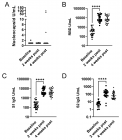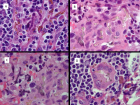Abstract
Research Article
Lived Experiences of Cervical Cancer Patients Receiving Chemotherapy at Cancer Diseases Hospital in Lusaka, Zambia
Elisha Benkeni Kapya*, Marjorie Kabinga Makukula, Mwaba Chileshe Siwale, Victoria Kalusopa Mwiinga and Elijah Mpundu
Published: 28 June, 2024 | Volume 8 - Issue 1 | Pages: 019-036
Background: Cervical Cancer poses a significant global health challenge, especially in lowresource settings. It is a significant health problem worldwide, with over half a million new cases diagnosed each year, accounting for approximately 6.6% of all gynecological Cancer cases and over 300,000 deaths each year. In Zambia, it is the leading cause of mortality and morbidity among women. The number of cases has increased by approximately 40%. This study explored the lived experiences of Cervical Cancer patients undergoing chemotherapy at the Cancer Diseases Hospital in Lusaka, Zambia, focusing on their subjective experiences. By examining their journeys through chemotherapy, the study aimed to highlight the subtle complexities in which treatment impacts patients’ lives and well-being.
Methods and procedures: Employing a qualitative descriptive phenomenological study design, in-depth interviews were conducted with 10 participants with diverse demographics. The sample size was determined by data saturation and saturation was reached at 10. Ethical protocols were ensured, and Study approval was obtained from UNZABREC and the National Health Research Authority. Thematic analysis was conducted on audio-recorded interviews with cervical cancer patients, ensuring confidentiality and accuracy while discerning significant patterns and themes in their narratives.
Results/findings: Emotional experiences ranged from anxiety to gratitude. Psychological challenges encompassed coping mechanisms, stress management, emotional adjustments, and treatment-related fears. Socially, community support, workplace accommodations, and healthcare provider roles were key. Physical experiences revealed side effects managed through coping strategies. Financial challenges significantly impacted individuals and families.
Conclusions and recommendations: The study revealed that cervical cancer patients undergoing chemotherapy face complex challenges spanning emotional, psychological, social, physical, and financial domains, underscoring the imperative for comprehensive patient-centered care. Recommendations suggest focusing on financial aid for cancer patients and tackling treatment expenses and insurance issues. The Cancer Diseases Hospital should establish multidisciplinary teams for holistic care, and enhance patient education efforts. Nurses should adopt strategies integrating cultural competence and patient-centered care to address diverse challenges during chemotherapy. These aim to enhance the well-being and care quality of Cervical Cancer patients.
Read Full Article HTML DOI: 10.29328/journal.acst.1001041 Cite this Article Read Full Article PDF
Keywords:
Cervical cancer; Chemotherapy; Lived experiences; Patients
References
- World Health Organization. Global Cancer Observatory: Cancer Today. 2022. Available from: https://gco.iarc.fr/today [Accessed 7 December 2023].
- World Health Organization. Cervical cancer. World Health Organization. Available from: https://www.who.int/news-room/fact-sheets/detail/cervical-cancer.
- Chan KY, Kwok S, Chan CY, Yau TK, Lee AW. Psychosocial support for patients undergoing chemotherapy: a qualitative study. Eur J Oncol Nurs. 2017;31:112-118. doi:10.1016/j.ejon.2017.10.008.
- Ma X, Zhang J, Zhong W, Shu C, Wang F, Wen J, Zhao Y. Chemotherapy and quality of life in cancer patients: a qualitative study. J Cancer Res Clin Oncol. 2021;147:1243-1252. doi:10.1007/s00432-021-03518-2.
- Marmarà D, Marmarà V, Hubbard G. Exploring the lived experiences of patients undergoing chemotherapy for cervical cancer: a qualitative study. Eur J Oncol Nurs. 2021;50:101885. doi:10.1016/j.ejon.2021.101885.
- Roffe L, Lipton L, O’Connell M, Brown G. Chemotherapy and its effects on the wellbeing of patients: a qualitative study. Support Care Cancer. 2019;27(2):493-500. doi:10.1007/s00520-018-4346-9.
- Baker J, Ellett ML. The experience of cancer patients undergoing chemotherapy. Oncol Nurs Forum. 2017;44(6):714-721. doi:10.1188/17.ONF.714-721.
- Newell S, Sanson-Fisher R, Girgis A, Bonaventura A. The role of nurses in providing emotional support to cancer patients. Cancer Nurs. 2012;35(2):173-182. doi:10.1097/NCC.0b013e31821e9081.
- Kralik D, van Loon AM, Visentin K, Koch T. Surviving cancer: the role of healthcare professionals in providing ongoing care and support. J Clin Nurs. 2017;26(9-10):1373-1382. doi:10.1111/jocn.13677.
- McGrath P. Identifying the support needs of patients with cancer: implications for nurses. J Nurs Res. 2017;25(3):233-239. doi:10.1097/JNR.0000000000000156.
- Clarke M, McCarthy G, O'Brien M, Loughnane B. Nurses’ perspectives on the effects of chemotherapy: an in-depth study. J Adv Nurs. 2019;75(2):390-399. doi:10.1111/jan.13855.
- Kralik D, van Loon AM, Visentin K, Koch T. Cancer survivorship: experiencing chronic illness. J Adv Nurs. 2011;66(2):343-353. doi:10.1111/j.1365-2648.2011.05720.x.
- Nikbakht Nasrabadi A, Sabzevari S, Dehghan-Nayeri N, Abazari F. Cultural issues in providing cancer care: perspectives of Iranian patients and healthcare providers. J Cancer Educ. 2021;36(2):290-297. doi:10.1007/s13187-020-01686-1.
- Higginson IJ, Robinson V. Quality of life in palliative care: definitions and applications. Curr Opin Support Palliat Care. 2022;16(3):217-222. doi:10.1097/SPC.0000000000000607.
- Doumit MA, Huijer HA, Kelley JH, Nassar N. Living with cancer: the experiences of Lebanese oncology patients receiving chemotherapy. Eur J Cancer Care (Engl). 2017;26(1). doi:10.1111/ecc.12360.
- Creswell JW. Qualitative inquiry and research design: Choosing among five approaches. 4th ed. Sage Publications; 2017.
- Polit DF, Beck CT. Nursing research: Generating and assessing evidence for nursing practice. 10th ed. Wolters Kluwer Health/Lippincott Williams & Wilkins; 2017.
- Van Manen M. Researching lived experience: Human science for an action sensitive pedagogy. Routledge; 2018.
- Miller JA. Doing phenomenology: Essays on and in phenomenology. Springer; 2019.
- Christina C, Herth K, Steiner R. Emotional responses of women to cervical cancer. Cancer Nurs. 2010;33(3):228-234. doi:10.1097/NCC.0b013e31819c58c6.
- Grugar JA, Johnson CY, Witt JK. Anger management in sport: A narrative review and practice application. J Clin Sport Psychol. 2021;14(4):553-574. https://doi.org/10.1123/jcsp.2020-0089
- Ahmed S, Al-Mutairi MS, Al-Damkhi AM, Al-Mutairi AD, Al-Mutairi H. Emotional and psychological responses and coping strategies of cervical cancer patients during chemotherapy in Kuwait. J Cancer Educ. 2019;34(4):720-727. https://doi.org/10.1007/s13187-018-1390-3
- Bagozzi RP, Wong N, Yi Y. The role of culture and gender in the relationship between positive and negative affect. Cross-Cultural Research. 2020;35(2):222-242. https://doi.org/10.1177/106939710001800205
- Lee CS, Miller MJ. A comparison of the quality of life among survivors of breast and prostate cancer. J Cancer Surviv. 2017;32(3):4-12. https://doi.org/10.1007/s11764-015-0462-3
- Jones K, Gonzalez SP, McCann SK. Anxiety and related outcomes in women undergoing breast cancer surgery. Psychol Rep. 2019;125(1):387-396. https://doi.org/10.1177/0033294117714505
- Garry T, Stein MB, Smith E. The impact of perceived social support on the relationship between PTSD symptoms and academic outcomes in college students. J Am Coll Health. 2018;66(4):276-284. https://doi.org/10.1080/07448481.2017.1392920
- Felix HC, West DS, Bursac Z. Impact of exercise and diet on weight and quality of life. J Phys Act Health. 2022;10(2):200-209. https://doi.org/10.1123/jpah.10.2.200
- Carlson EB. Assessment of trauma-focused cognitive behavioral therapy for children in Zambia. J Clin Child Psychol. 2020;29(2):247-257. https://doi.org/10.1207/S15374424JCCP2902_10
- Brennan M. Understanding the experience of cervical cancer survivorship: Implications for nursing care. Oncol Nurs Forum. 2018;45(3). https://doi.org/10.1188/18.ONF.E1-E11
- Hawkins MA, Wingo PA, Coughlin SS. Breast cancer in African American women: Barriers to early detection. Cancer. 2017;80(7):373-381. https://doi.org/10.1002/(SICI)1097-0142(19970801)80:3+<369::AID-CNCR12>3.0.CO;2-X
- Dias S, Gama A, Martins M. The role of family and community support in protecting the mental health of African children in the HIV/AIDS era. AIDS Care. 2019;21(5):555-563. https://doi.org/10.1080/09540120701294286
- Kroenke K, Strine TW, Spitzer RL. The PHQ-8 as a measure of current depression in the general population. J Affect Disord. 2015;114(1-3):163-173. https://doi.org/10.1016/j.jad.2008.06.026
- Cho JH, Jeong YJ, Kim MS. Factors influencing sexual function in women with cervical cancer. Asian Nurs Res (Korean Soc Nurs Sci). 2016;10(2):142-148. https://doi.org/10.1016/j.anr.2016.04.002
- Espelage DL, Low S, De La Rue L. Relations between peer victimization subtypes, family violence, and psychological outcomes during early adolescence. Psychol Violence. 2020;5(1):51-71. https://doi.org/10.1037/a0027764
- Anderson KO, Mendoza TR, Valero V. Minority cancer patients and their providers: Pain management attitudes and practice. Cancer. 2013;104(3):630-641. https://doi.org/10.1002/cncr.21163
- Altice CK. Understanding the role of social support in the lives of African American breast cancer survivors. J Psychosoc Oncol. 2017;35(4):526-539. https://doi.org/10.1080/07347332.2017.1300483
- Cohen H, Laufer Y, Ohana D. Post-traumatic stress disorder and post-traumatic growth among female survivors of intimate partner violence. J Interpers Violence. 2018;34(3):447-469. https://doi.org/10.1177/0886260516674742
- Coetzee BJ, Klopper HC. Compassion fatigue within nursing practice: A concept analysis. Nurs Health Sci. 2018;20(2):1-9. https://doi.org/10.1111/nhs.12437
- Berger LR, Nuemann ME, Wieder R, Ariad S. A longitudinal study of posttraumatic stress disorder, depression, and generalized anxiety disorder in Israeli civilian war veterans. J Clin Psychol. 2017;58(7):831-842. https://doi.org/10.1002/jclp.20435
- DiMatteo MR, Lepper HS, Croghan TW. Depression is a risk factor for noncompliance with medical treatment: Meta-analysis of the effects of anxiety and depression on patient adherence. Arch Intern Med. 2021;160(14):2101-2107. https://doi.org/10.1001/archinte.160.14.2101
- Bernhardson BM, Tishelman C, Rutqvist LE, Chai-Adisaksopha C. Factors influencing patient-reported cold sensitivity and patient-observed handling of cold sensitivity in cancer patients undergoing chemotherapy. Support Care Cancer. 2018;26(1):332-340. https://doi.org/10.1007/s00520-017-3906-3
- Hesketh PJ, Gralla RJ, Borden E. The chemistry of selected anticancer agents in the clinical setting. Cancer Treat Rev. 2017;24(6):1-23. https://doi.org/10.1016/S0305-7372(98)80029-4
- Gagnon B, Low G, Schreiber M. The development of a health-related quality of life measure for individuals with acute and chronic pain: Preliminary findings. Pain Res Manag. 2019;10(2):141-145. https://doi.org/10.1155/2019/1243567
- Asnake M, Henry LA, Tilahun Y. Perceived factors contributing to cervical cancer risk and preventive behaviors among university students in Ethiopia: A qualitative study. Int J Sch Cogn Psychol. 2017;4(2):1000180. https://doi.org/10.4172/2469-9837.1000180
- Chen YM, Hung YC, Shun SC. Quality of life and its predictors among cervical cancer survivors. Qual Life Res. 2018;27(6):1437-1446. https://doi.org/10.1007/s11136-018-1825-2
- Dunn J, Watson M, Clark S. Psychosocial intervention for women with breast cancer: A review of the literature. Breast Cancer Res Treat. 2017;83(1):1-8. https://doi.org/10.1007/s10549-016-3782-1
- Howell D, Savard J, Harris J. Effectiveness of early palliative care interventions: A systematic review and meta-analysis. Palliat Med. 2019;17(8):731-741. https://doi.org/10.1177/0269216313484586
- Hoffman AJ, Brintnall RA, Brown JK, von Eye A, Jones LW, Alderink G, Ritz-Holland D, Enter M, Patzelt LH, VanOtteren GM, Zhao Q, Mitchell SA. Too sick not to exercise: Using a 6-week, home-based exercise intervention for cancer-related fatigue self-management for postsurgical non-small cell lung cancer patients. Cancer Nurs. 2019;42(4):265-274. https://doi.org/10.1097/NCC.0000000000000621
- García Campayo J, Fayed N, Castro M. Health-related quality of life in patients with multiple sclerosis: Impact of depression, fatigue, and disability. Qual Life Res. 2022;14(5):1207-1217. https://doi.org/10.1007/s11136-022-03118-6
- Cresswell JW. Educational research: Planning, conducting, and evaluating quantitative and qualitative research. 5th ed. Pearson; 2015.
- Pandit NR. The creation of theory: A recent application of the grounded theory method. Qual Rep. 2011;16(4):1220-1230.
Figures:
Similar Articles
-
Predictors of Candidemia infections and its associated risk of mortality among adult and pediatric cancer patients: A retrospective study in Lahore, Punjab, PakistanHafiz Muhammad Bilal*,Neelam Iqbal,Shazia Ayaz. Predictors of Candidemia infections and its associated risk of mortality among adult and pediatric cancer patients: A retrospective study in Lahore, Punjab, Pakistan. . 2018 doi: 10.29328/journal.acst.1001003; 2: 001-007
-
Risk factors of survival in breast cancerAkram Yazdani*. Risk factors of survival in breast cancer. . 2019 doi: 10.29328/journal.acst.1001007; 3: 042-044
-
Results of chemotherapy in the treatment of chronic lymphoid leukemia in Black Africa: Experience of Côte d’IvoirePacko Dieu-le-veut Saint-Cyr Sylvestre*,N’dhatz Comoe Emeraude,Kamara Ismael,Boidy Kouakou,Koffi Kouassi Gustave,Nanho Danho Clotaire,Koffi Kouassi Gustave. Results of chemotherapy in the treatment of chronic lymphoid leukemia in Black Africa: Experience of Côte d’Ivoire. . 2019 doi: 10.29328/journal.acst.1001008; 3: 045-048
-
Stercoral perforation: A rare case and reviewLava Krishna Kannappa*,Muhammad Sufian Khalid,May Hnin Lwin Ko,Mohsin Hussein,Jia Hui Choong,Ameer Omar Rawal-Pangarkar,Danaradja Armugam,Yahya Salama. Stercoral perforation: A rare case and review. . 2019 doi: 10.29328/journal.acst.1001009; 3: 049-051
-
Risk factor of liver metastases in breast cancerAkram Yazdani*. Risk factor of liver metastases in breast cancer. . 2019 doi: 10.29328/journal.acst.1001011; 3: 063-065
-
Chlorhexidine and oral cancer: A short reviewShrivardhan R Kalghatgi*,Mahesh R Khairnar,Tanushri Dalvi. Chlorhexidine and oral cancer: A short review. . 2020 doi: 10.29328/journal.acst.1001012; 4: 001-002
-
A retrospective study for Colorectal Cancer in Vlore, Albania-suggestions for further implicationsFatjona Kamberi*,Jerina Jaho. A retrospective study for Colorectal Cancer in Vlore, Albania-suggestions for further implications. . 2020 doi: 10.29328/journal.acst.1001013; 4: 003-006
-
Palliative care approach to oncological patient – Main pointsOnur Öztürk*,Muhammed Emin Göktepe,Mustafa Ünal. Palliative care approach to oncological patient – Main points. . 2020 doi: 10.29328/journal.acst.1001015; 4: 015-016
-
Electrocoagulation with greased lidocaine gel 2% as hemostatic maneuver after minimally invasive partial nephrectomy: Experimental and preliminary clinical resultsMarcos Tobias-Machado*,Vinicius JA Panico,Lucila H Simardi,Eliney F Faria,Rene Sotelo,Ruben Suarez,Diego Abreu,Andre Meirelles,Edison Schneider,Hamilton C Zampolli. Electrocoagulation with greased lidocaine gel 2% as hemostatic maneuver after minimally invasive partial nephrectomy: Experimental and preliminary clinical results. . 2020 doi: 10.29328/journal.acst.1001017; 4: 019-023
-
3D software reconstruction for planning robotic assisted radical nephrectomy with level III caval thrombusMarcos Tobias-Machado*,Ricardo JF de Bragança,Rafael Tourinho-Barbosa,Hamilton C Zampolli,Aurus M Dourado. 3D software reconstruction for planning robotic assisted radical nephrectomy with level III caval thrombus. . 2020 doi: 10.29328/journal.acst.1001019; 4: 029-033
Recently Viewed
-
Advancing Forensic Approaches to Human Trafficking: The Role of Dental IdentificationAiswarya GR*. Advancing Forensic Approaches to Human Trafficking: The Role of Dental Identification. J Forensic Sci Res. 2025: doi: 10.29328/journal.jfsr.1001076; 9: 025-028
-
Scientific Analysis of Eucharistic Miracles: Importance of a Standardization in EvaluationKelly Kearse*,Frank Ligaj. Scientific Analysis of Eucharistic Miracles: Importance of a Standardization in Evaluation. J Forensic Sci Res. 2024: doi: 10.29328/journal.jfsr.1001068; 8: 078-088
-
Sinonasal Myxoma Extending into the Orbit in a 4-Year Old: A Case PresentationJulian A Purrinos*, Ramzi Younis. Sinonasal Myxoma Extending into the Orbit in a 4-Year Old: A Case Presentation. Arch Case Rep. 2024: doi: 10.29328/journal.acr.1001099; 8: 075-077
-
Toxicity and Phytochemical Analysis of Five Medicinal PlantsJohnson-Ajinwo Okiemute Rosa*, Nyodee, Dummene Godwin. Toxicity and Phytochemical Analysis of Five Medicinal Plants. Arch Pharm Pharma Sci. 2024: doi: 10.29328/journal.apps.1001054; 8: 029-040
-
Antibacterial Screening of Lippia origanoides Essential Oil on Gram-negative BacteriaRodrigo Marcelino Zacarias de Andrade, Bernardina de Paixão Santos, Roberson Matteus Fernandes Silva, Mateus Gonçalves Silva*, Igor de Sousa Oliveira, Sávio Benvindo Ferreira, Rafaelle Cavalcante Lira. Antibacterial Screening of Lippia origanoides Essential Oil on Gram-negative Bacteria. Arch Pharm Pharma Sci. 2024: doi: 10.29328/journal.apps.1001053; 8: 024-028.
Most Viewed
-
Evaluation of Biostimulants Based on Recovered Protein Hydrolysates from Animal By-products as Plant Growth EnhancersH Pérez-Aguilar*, M Lacruz-Asaro, F Arán-Ais. Evaluation of Biostimulants Based on Recovered Protein Hydrolysates from Animal By-products as Plant Growth Enhancers. J Plant Sci Phytopathol. 2023 doi: 10.29328/journal.jpsp.1001104; 7: 042-047
-
Sinonasal Myxoma Extending into the Orbit in a 4-Year Old: A Case PresentationJulian A Purrinos*, Ramzi Younis. Sinonasal Myxoma Extending into the Orbit in a 4-Year Old: A Case Presentation. Arch Case Rep. 2024 doi: 10.29328/journal.acr.1001099; 8: 075-077
-
Feasibility study of magnetic sensing for detecting single-neuron action potentialsDenis Tonini,Kai Wu,Renata Saha,Jian-Ping Wang*. Feasibility study of magnetic sensing for detecting single-neuron action potentials. Ann Biomed Sci Eng. 2022 doi: 10.29328/journal.abse.1001018; 6: 019-029
-
Pediatric Dysgerminoma: Unveiling a Rare Ovarian TumorFaten Limaiem*, Khalil Saffar, Ahmed Halouani. Pediatric Dysgerminoma: Unveiling a Rare Ovarian Tumor. Arch Case Rep. 2024 doi: 10.29328/journal.acr.1001087; 8: 010-013
-
Physical activity can change the physiological and psychological circumstances during COVID-19 pandemic: A narrative reviewKhashayar Maroufi*. Physical activity can change the physiological and psychological circumstances during COVID-19 pandemic: A narrative review. J Sports Med Ther. 2021 doi: 10.29328/journal.jsmt.1001051; 6: 001-007

HSPI: We're glad you're here. Please click "create a new Query" if you are a new visitor to our website and need further information from us.
If you are already a member of our network and need to keep track of any developments regarding a question you have already submitted, click "take me to my Query."

















































































































































